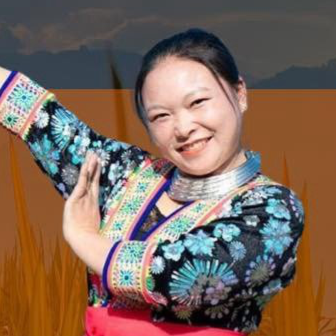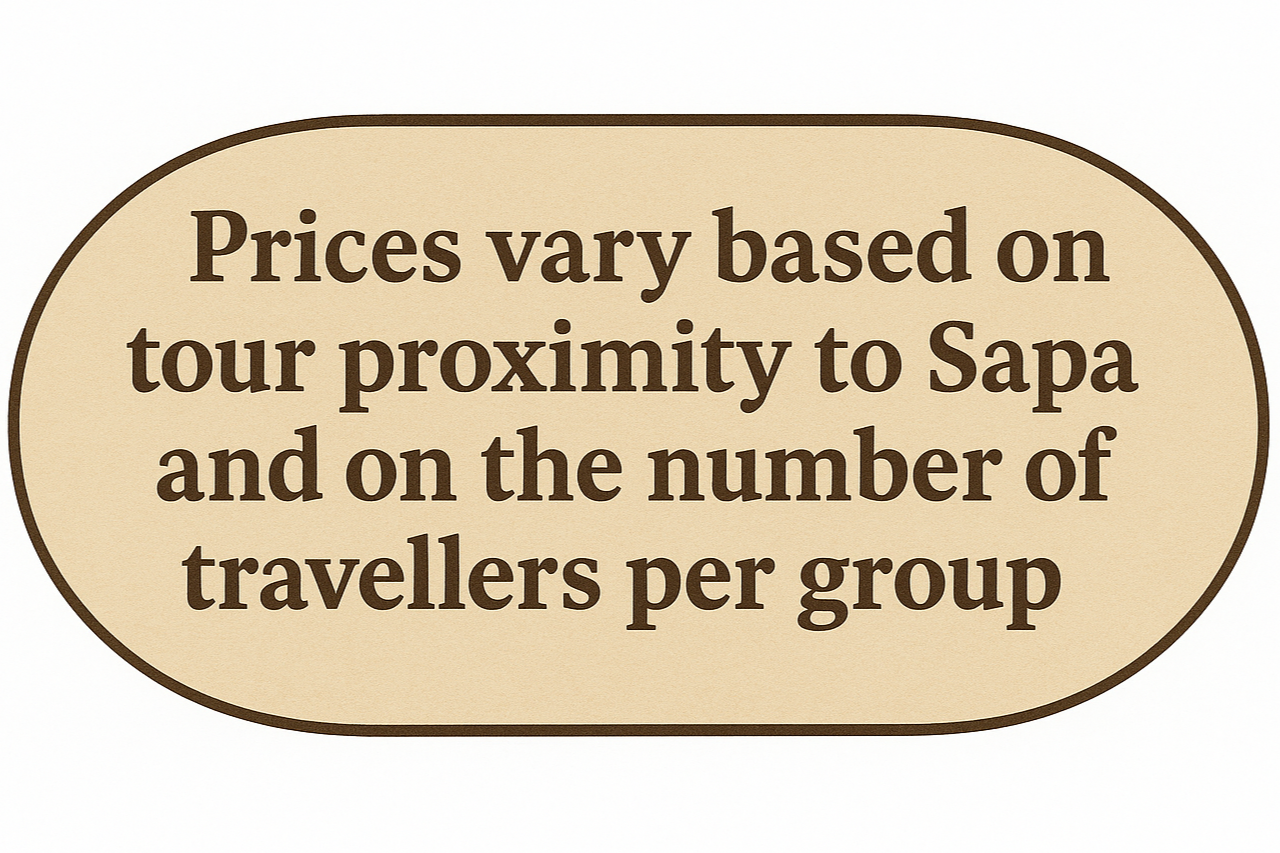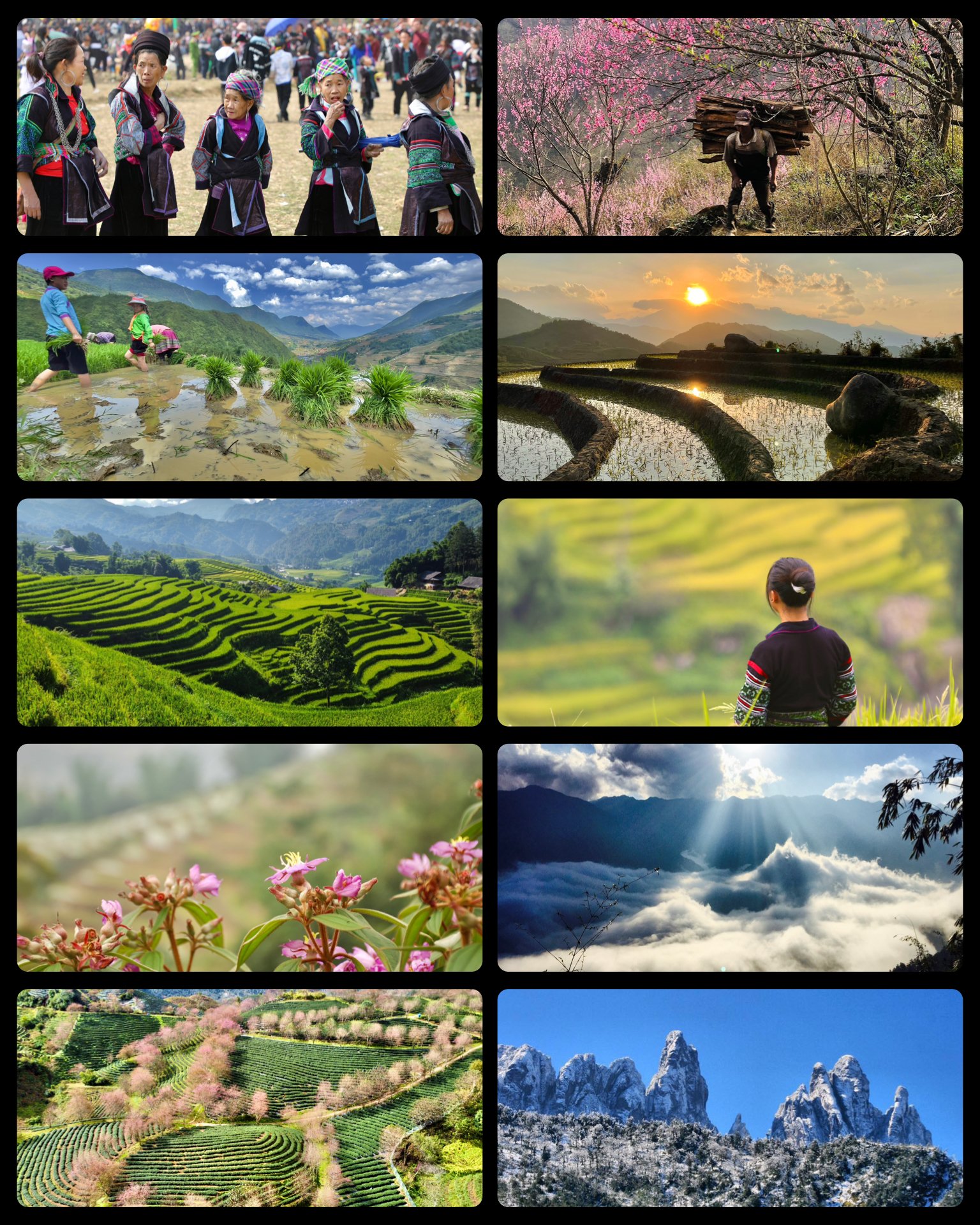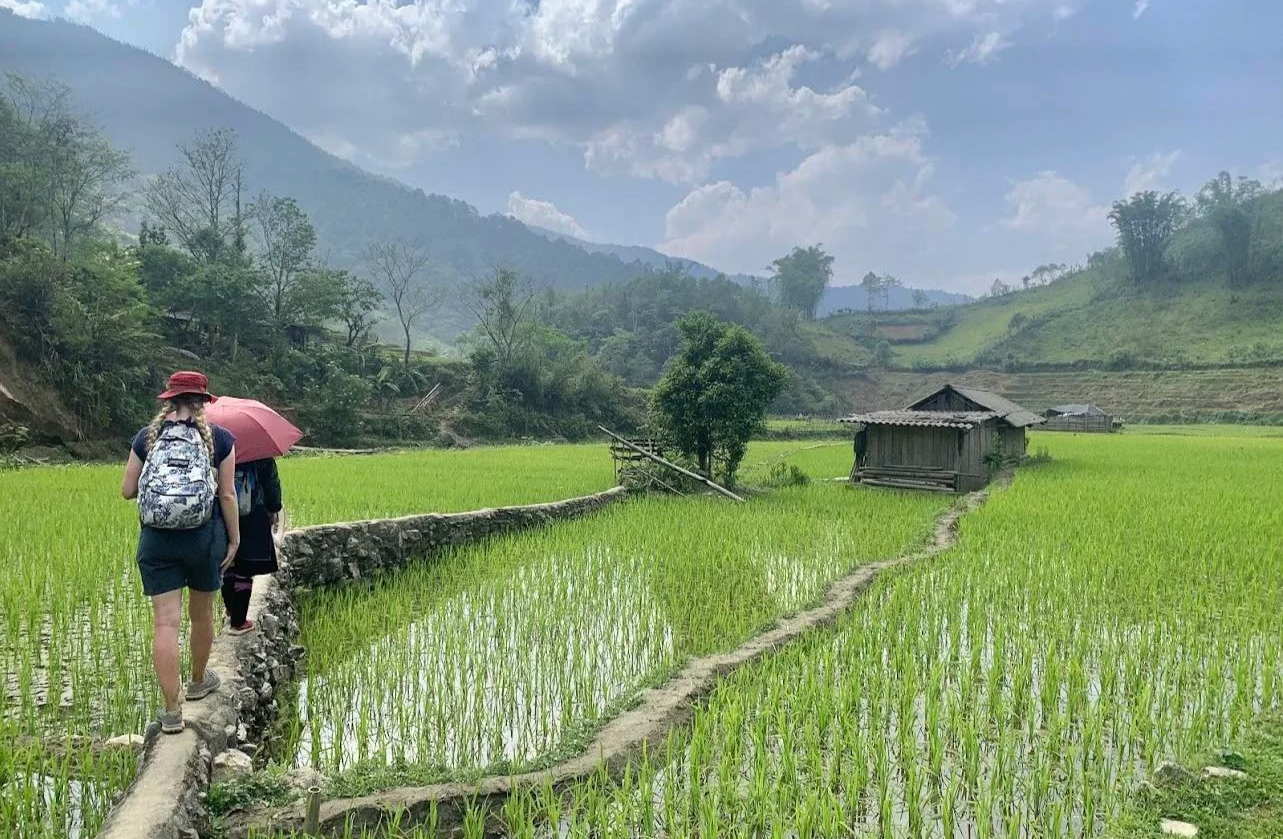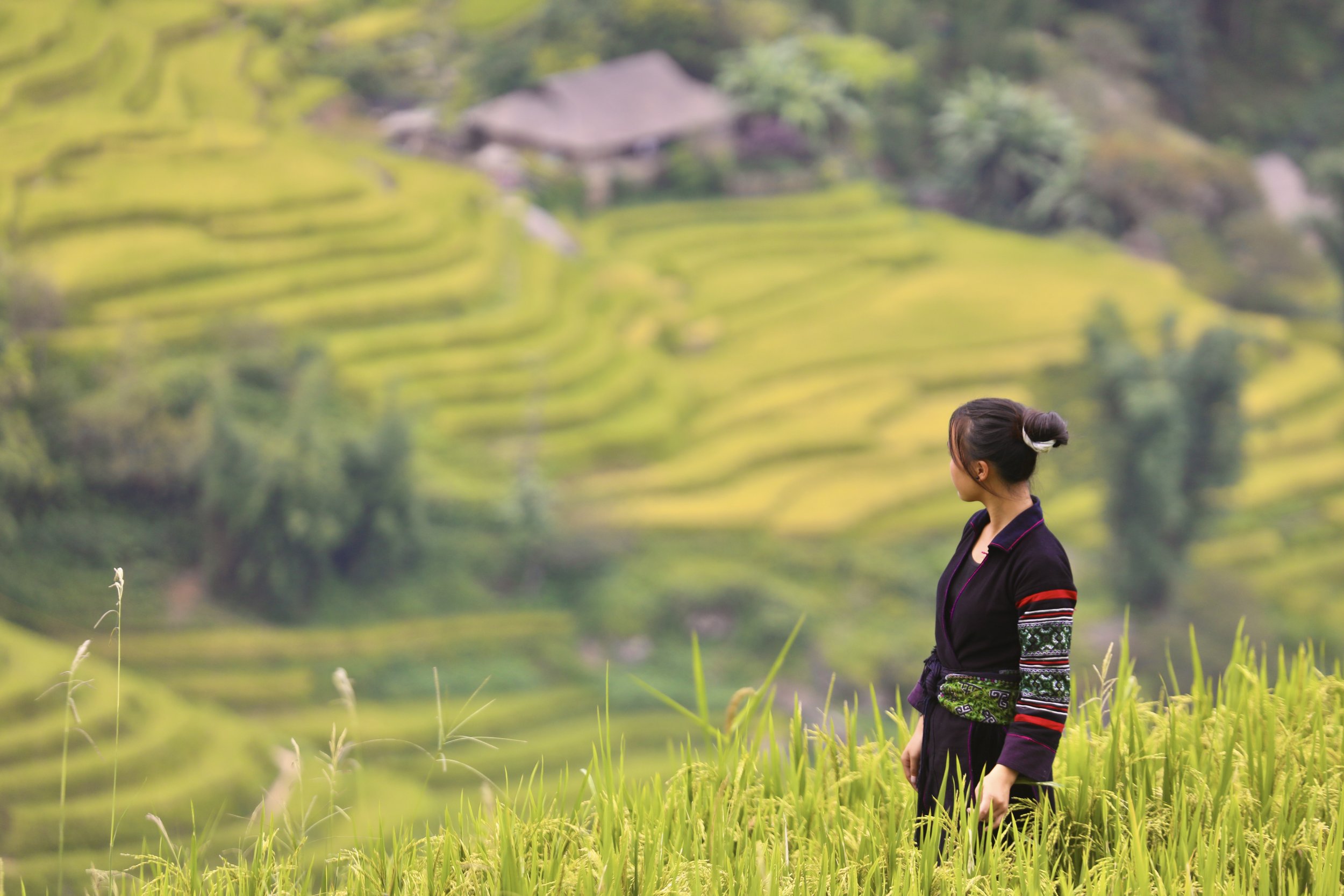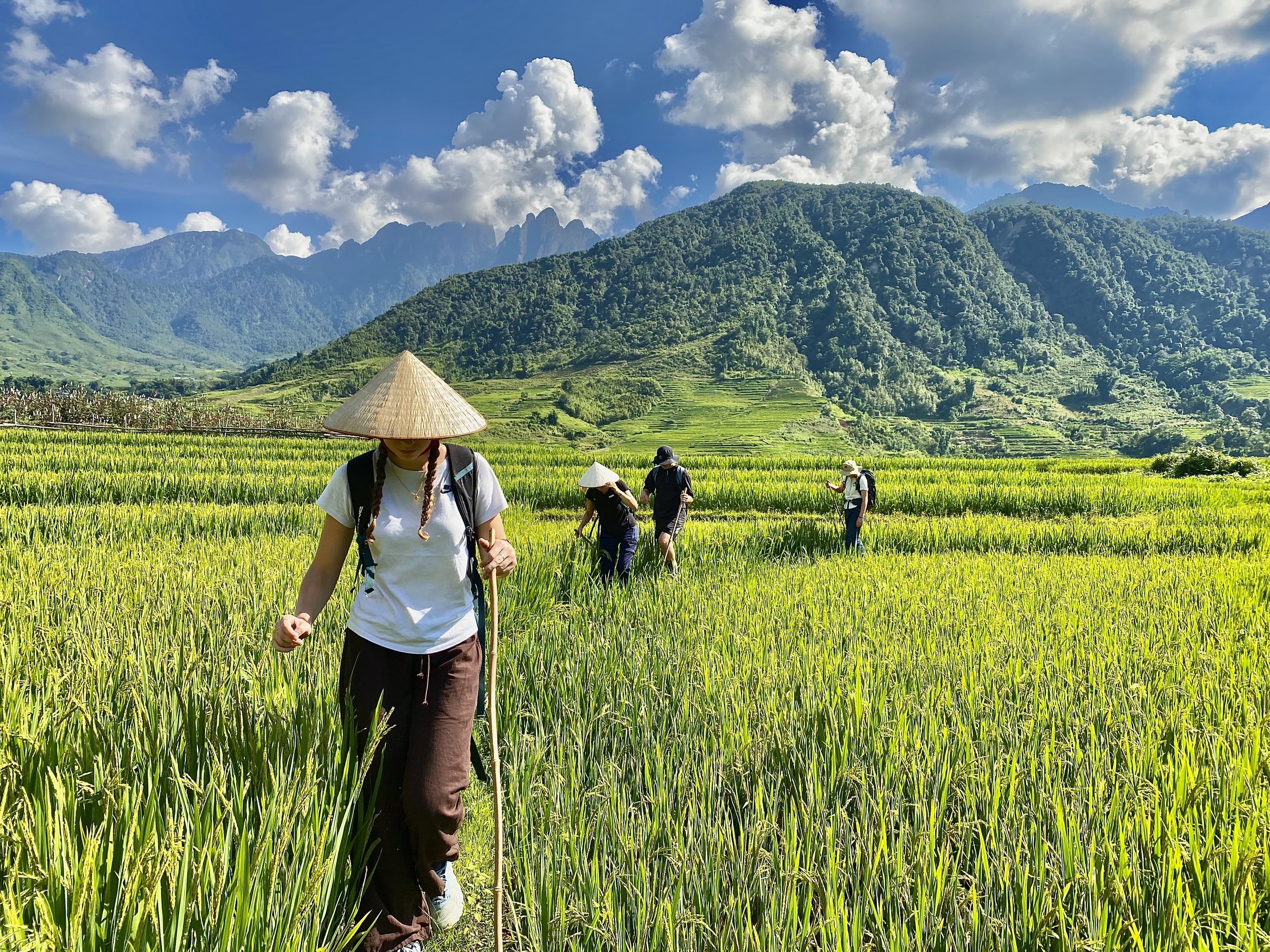
Ethical Sapa Trekking Tours with Local Hmong & Dao Guides
Looking for the most ethical way to go trekking in Sapa? Start here.
Quick links
What Makes Trekking in Sapa Ethical?
Trekking in Sapa is often described as a cultural experience, but what makes it truly ethical is who you walk with.
In many tourism destinations around the world, guides are recruited from cities. The same is true for most large group treks in Sapa, but there is another way. Here, local Hmong and Dao people have taught themselves English and other languages over many years by speaking directly with travellers. Their language skills are mostly oral, learned through real conversations rather than classrooms.
This creates a rare opportunity: visitors can trek directly with local guides inside their own communities, without the need for outside, city-based intermediaries.
When you walk with a Hmong or Dao guide:
You are walking through her home landscape
You are meeting her neighbours and relatives
You are learning about daily life from someone who lives it
Your money stays inside the village economy
Ethical trekking in Sapa means removing the barrier between traveller and community, and allowing local people to guide you through their own world.
Why Most Sapa Treks Are Not Ethical
Many treks in Sapa look similar on the surface — walking through rice terraces, visiting villages, staying in homestays — but the structure behind them is very different.
Most trekking tours in Sapa still operate using:
Large mixed groups
Kinh Vietnamese guides from cities
Vietnamese-owned restaurants for lunch stops
Hostel-style homestays built for tourists
Unlicensed guides avoiding tax and insurance obligations
In these cases, much of the tourism income is pulled away from the ethnic minority villages that travellers believe they are supporting.
A growing problem in Sapa is the rise of unlicensed guiding. Some individuals take large groups without registering as businesses, avoiding tax, avoiding national insurance contributions, yet still benefiting from subsidised healthcare and free schooling. As income from tourism increases for a few, visible wealth differences begin to appear within villages; luxury cars, high-end phones, and widening inequality.
This creates tension inside communities and undermines the idea that tourism should benefit everyone.
Trekking itself is not automatically ethical. It depends entirely on how the tour is structured and who benefits.
Trek with Hmong & Dao Guides in Remote Villages
There is another way to run trekking in Sapa.
ETHOS treks are designed to spread tourism income across many families, not concentrate it in a few hands.
We work exclusively with:
Hmong and Dao women guides
Local ethnic minority drivers
Family homes that host lunch stops
Family homes that host overnight homestays
Each trek supports multiple households in different villages. Every stop along the route is part of a network of families who are directly involved in tourism in a fair and sustainable way.
This model keeps money circulating inside the community and allows more people to benefit from visitors, while preserving the authenticity of the experience for travellers.
When you trek with ETHOS, you are not just walking through villages — you are participating in a system that strengthens them.
Ethical Sapa Trekking Tours — Private & Multi-Day
Walk softly, travel meaningfully.
Discover quiet trails, stay with Hmong and Red Dao families, and trek with women guides whose communities benefit directly from your journey.
Every ETHOS experience supports fair wages, skills training, and environmental stewardship; ensuring every step you take has a positive impact.
Trekking through Sapa’s rice terraces and hill villages is one of Vietnam’s most memorable experiences. Yet every path you walk crosses both landscape and livelihood. At ETHOS – Spirit of the Community, we believe travel should uplift the places it touches. This checklist helps you prepare, pack and walk with care, ensuring your journey leaves a positive footprint on people, culture and nature alike. See our Ethical Trekking in Sapa: A Traveller’s Checklist for more details.
Why Choose ETHOS for Ethical Trekking in Sapa
Women-led treks, fair wages, and real community impact in every step.
At ETHOS, we believe adventure should uplift everyone it touches; travellers, guides, and the land itself. Our ethical trekking model is built on fair partnerships, respect for culture, and stewardship of the stunning environment we call home. Every step on the trail is guided by care for the people who lead our journeys, and the communities that welcome you into their lives.
Women-led, community-first guiding
True off-the-beaten-path routes (quiet rice terraces & villages)
Fair wages & transparent impact
Small groups (max 6) and fully private
Our guides are the heart of ETHOS. We ensure that their talent, time, and knowledge are valued through:
Fair wages that exceed regional standards.
Sick pay, maternity leave, and health insurance, ensuring security and dignity beyond the trekking season.
Training and certification in risk assessment, first aid, hygiene, and food preparation; empowering guides with professional skills that build lifelong confidence.
Ongoing development through team-building trips and shared travel experiences that strengthen both friendships and leadership.
Caring for the Land
We believe that true adventure should protect the places it explores.
ETHOS guides lead regular village cleanups and education initiatives that teach sustainable practices.
We minimise single-use plastic, promote zero-waste trekking, and support reforestation and conservation projects around Sapa through local partnerships.
Every trek leaves footprints and a legacy of care.
Ethical Sapa Trekking Tours — Private & Small Group
ETHOS offers private and small-group trekking tours in Sapa ranging from gentle one-day walks to multi-day homestay adventures. We don’t group travellers together but if you’re travelling with friends or family, we are here to help. Every route is designed by local Hmong and Dao guides to avoid tourist trails and support remote villages.
Sapa Trekking Tour Itineraries (1, 2 & 3 Day Options)
1-Day Quiet Terraces & Village Lunch – 8 to 12km | gentle | year-round. This trek is often led by May Linh, a Red Dao woman from Giang Ta Chai village, who demonstrates her medicinal plant expertise while trekking through the Sapa forests.
2-Day Hmong Homestay Trek – 18 to 24km | moderate | homestay night. This adventure was designed by Ly Thi My, a Black Hmong woman from Sapa who has been with the ETHOS team since the very beginning.
Family Mini-Trek – 6 to 8km | easy | kid-friendly. This trek is often led by Ly Thi Ker, a Black Hmong woman from Lao Chai village, who shares stories of her childhood among the rice terraces.
2-Day Motorbike Loop – 120km | self-drive or easyrider | homestay night. An adventurous motorbike loop often led by Ly Thi Cha, a youth leader and ETHOS ambassador who has a passion for travel and culture.
Discover all our experiences – treks | workshops | motorbike loops
Meet Your Guides
Each ETHOS trek is designed by the guides blending their home villages, family trails, and favourite viewpoints into beautiful journeys. Every trek with ETHOS is led by women from local minority communities. Each guide brings unique stories, songs, and traditions to the journey.
Each ETHOS guide is a storyteller, mother, farmer, and trailblazer in her community. Tap a portrait to read her story:
What’s Included $-$$
Licensed local guide(s)
Lunches (and dinners/breakfasts on multi-day) with host families
Drinking water, permits, village contributions
Homestay bedding & mosquito nets (multi-day)
Fitness Levels
Easy • Moderate • Moderate-Challenging. Tell us your pace; we tailor distances and elevation.
Best Season
Feb–Apr: cool, clear views
May–Jul: terraces bright green (planting)
Aug–Sep: golden harvest
Oct–Jan: crisp & dry; chilly nights
Ethical Travel
Walk respectfully: ask before photos, buy directly from makers, and follow village etiquette. Your trek also funds fair wages, sick pay, health insurance, and maternity leave for our guides, plus community programs like anti–human trafficking workshops and village clean-ups. Travel here is about where you walk and about the change your journey supports.
What to Pack
Broken-in shoes, light rain layer, reusable water bottle, and modest clothing for villages.
See our full Ethical Sapa Trekking Packing List →
How Booking Works
Tell us dates, pace, interests
We propose a route & price
Confirm with deposit; we send packing & weather tips
Ready to trek with our local team? Jump to our [Ethical Sapa Trekking Tours]
Our Top Tips
Whether you’re planning your first Sapa trek or returning for new routes, these tips will help you travel thoughtfully and choose the right experience.
1 - Look for local expertise, preferably an experienced guide from the Hmong or Dao ethnic groups.
This will open up greater cultural opportunities. All guides dealing with international travellers are required have a licence or work with a company who have an Inbound Tour Operator certificate. Without this, your trek will be illegal & almost certainly uninsured. Avoid this by asking your guide their licence number.
2 - Choose your trip carefully.
While villages like Lao Chai & Ta Van have developed to cater for tourists, they have begun to lose their traditional charm. If you need WiFi, a hot shower and access to bars, then these are the villages for you. They have a backpacker feel and are good places to meet other travellers. They do experience a large volume of tour groups every day. As you walk along the road towards your homestay, rice field views are obscured by buildings constructed to cater for tourism. These are the villages people are talking about whenever they mention that Sapa is too touristic. Likewise, Cat Cat Village is owned by a tour company and is an ideal option if you like the thought of dressing up in tribal clothes and seeing organised dances and routines with hundreds of other paying spectators. Think of this village as an attraction rife with cultural appropriation. It has many newly built attractions, a theme park feel and is very busy. If you’re interested in nature, culture or authenticity, this place will not suit you. Do some research and find a trek that suits you. Because almost everyone goes to these few locations, it does mean that the all of the other villages are wonderfully authentic. If you want an off the beaten track adventure, away from tourists, look at organisations such as ETHOS who offer award winning private treks and motorbike trips with experienced local guides to more remote areas. All treks and experiences are tailored to the needs of the traveller.
3 - Ask your chosen guide where your money goes.
In an area where many of the population are poor, it is essential that income from tourism spreads to more than one individual. Have a look at their literature or social media to gauge what they are like as individuals or as an organisation. Are they in tourism purely for profit or are they involved in community development projects like village clean ups or education for instance?
4 - Be prepared for a decent hike.
Sturdy walking shoes are essential. Depending on recent weather conditions, paths can be slippery regardless of what you have on your feet. Choose a hike and difficulty level that suits your personal fitness levels. Walking in a big group will mean your guide will choose a route that the least well prepared can manage. Alternatively, you’ll end up with an unpaid entourage of local ladies hoping to help you over the slippery sections in exchange for you buying their textiles. This can be eliminated by assuring a fair distribution of wages and choosing a private trek. Groups of five or less are recommended.
5 - Do an overnight experience.
Staying with a local family, in their village, in their home, is incredible.
6 - Time your visit well.
While Sunday plays hosts to the busiest market day, weekends see many more travellers, particularly Vietnamese from the lowlands. A typical weekend sees Sapa’s visitor numbers swell to almost ten times that of a typical week day. Hotel rooms become more expensive and the town becomes noisy.
FAQ’s
Q: What makes ETHOS trekking tours ethical?
A: ETHOS ensures fair wages, health insurance, and skills training for local women guides, while supporting environmental and anti-trafficking initiatives.
Q: Is trekking in Sapa suitable for beginners?
A: Yes. ETHOS offers gentle walks to multi-day treks, each adapted to your fitness level and interests.
Q: When’s the best time to trek in Sapa?
A: Sapa changes with the seasons, and each month brings something different to see, feel, and experience. From misty mornings in January to golden rice terraces in September, this landscape has its own rhythm shaped by weather, farming cycles, and local traditions. For a full rundown, click here.
Q: Is all trekking in Sapa ethical?
No. Trekking becomes ethical only when local communities are directly involved, fairly paid, and protected by proper licensing and regulation.
Q: How can I tell if a trek is ethical?
Ask who your guide is, whether they are licensed, where your lunch stops are, and who owns the homestay. If the answers involve local families and ethnic minority guides, it is likely ethical.
Q: Do ETHOS guides come from the villages we visit?
Yes. Our Hmong and Dao guides live in the areas where they guide. They are not brought in from outside.
Q: Why does licensing matter?
Licensed guides contribute to tax, insurance, and social systems that support their communities. Unlicensed guiding may seem cheaper but often harms long-term community welfare.
Q: How does my trek support villages?
Your trek supports guides, drivers, cooks, and host families across several villages, ensuring tourism income is shared more widely.
Book Now
Start Planning Your Trek with ETHOS





